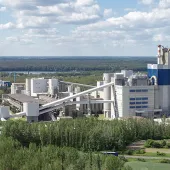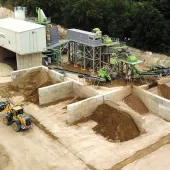Cemex and Silverwoods help close the loop
Partnership up-values nearly 130,000 tonnes of kiln bypass dust for agricultural purposes
CEMEX and waste-management company Silverwoods are successfully supporting the circular economy by utilizing bypass dust (BPD) from the Cemex Rugby cement kiln for agricultural purposes. Since 2015, nearly 130,000 tonnes of BPD have been recovered through the partnership.BPD is ideal for use on farmland due to its high potassium and lime content, meaning it can provide a direct sustainable replacement for traditional fertilizers and lime.
Additionally, by reusing BPD, Cemex have been able to dramatically reduce the amount of process by-product they landfill; this figure is now zero.
Contributing to the circular economy is a key pillar of Cemex’s Future in Action climate action strategy, which has set a global target for Cemex to become a net-zero company by 2050. In addition, recovering BPD supports Cemex’s 2030 target to increase the ratio of waste-derived sources managed versus waste sent for disposal.
Paul Fletcher, head of sustainability for Cemex Europe, commented: ‘We are very proud of our partnership with Silverwoods and the considerable positive impact their innovation and expertise has had on our ability to reuse BPD for other applications. We believe it leads the way in our industry and presents real potential to be adapted elsewhere across our operation; not only does it benefit the environment by reducing the amount of materials that need to be disposed of, but it also generates a product that has a value for farmers and helps cut the use of traditional materials.
‘Indeed, the value of this partnership demonstrates that to deliver true circularity, more industrial by-products, including those from different sectors of the economy, need to be used as secondary resources, rather than primarily be seen as waste. If this is to be achieved, a new perspective is needed to boost circular economy practices, with regulations and permitting supporting this proactively.’
To further explore the benefits of using Cemex’s BPD in an agricultural setting, Silverwoods have funded two research and development PhD studies. The first identified the agronomic benefits of the land application of bypass dust, whilst the second, which is currently ongoing, attempts to calculate how much carbon can be captured and sequestered from the land application of BPD through enhanced rock weathering and also via improved crop performance.
This research was recently recognized at the Eco Innovation North West Awards at the Museum of Science and Industry, Manchester, organized by Lancaster University, winning the Carbon Journey Award.
Julian Silverwood, managing director, said: ‘We are thrilled to win this recognition from Eco-I North West. Our work with Lancaster University has been a huge success in helping us understand the full carbon-sequestration potential of cement bypass dust when applied to agricultural soils. It has validated that there is huge potential for the use of industrial waste to establish negative-emission solutions, which is good for the environment and contributes to the UK’s aim to reach net-zero emissions by 2050.’










